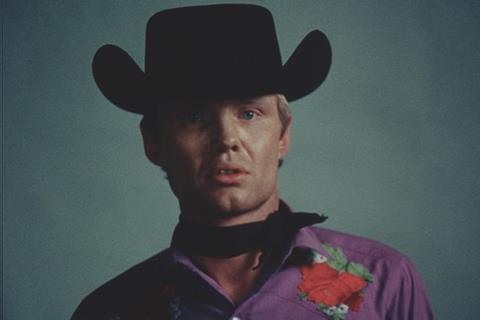The landmark 1969 Oscar-winner is celebrated in Nancy Buirski’s revealing documentary

Dir: Nancy Buirski. US. 2022. 101 mins.
”I’m walkin’ here!” Midnight Cowboy is a terrific film to revisit, especially in the current climate. The 1969 production has achieved national-monument status in film history for a myriad of reasons which Nancy Buirski’s documentary explores. From its subject matter to its stars, its status as ”the only X-rated film to win an Oscar”, the creative forces who forged it, the political and moral climate into which it launched, the film provided Glenn Frankel with over 400 pages of analysis for his 2021 book Shooting Midnight Cowboy: Art, Sex, Loneliness, Liberation, And The Making Of A Dark Classic, which inspired this Venice Classics film.
Her documentary is a snapshot of a time but also a continuation of a conversation
Buirski (The Loving Story, The Rape Of Recy Taylor) adopts a similarly wide-ranging approach to the picture, helped by interviews with the film’s star Jon Voight — back then a jobbing actor hustling for a role as a male prostitute, now an angry Trump supporter. His co-star, Dustin Hoffman, does not appear in Buirski’s film, his voice restricted to some archive recording. As he’s usually a garrulous sort, Hoffman’s absence is a question which hangs over the film, despite commentary from Brian De Palma, Bob Balaban and, in particular, Jennifer Salt, who co-starred in the film and is the daughter of Midnight Cowboy’s formerly blacklisted screenwriter Waldo Salt.
Hoffman is a loss as Desperate Souls pays welcome attention to the career of its director, Britain’s John Schlesinger, who went on to direct the actor again in Marathon Man and might have shed more light on the project. (Midnight Cowboy, Schlesenger’s first film in Hollywood after the UK flop of Far From The Madding Crowd, won the Best Picture Oscar and revived his career.) Still, though, any festival or retrospective event would love to show Desperate Souls to cinephiles and anyone interested in a time — the late 1960s — when a big studio like United Artists would back a bracing, queer—themed, fiercely independent-spirited film written and directed by two closeted gay men (Schlesinger, and the writer of the book in which Midnight Cowboy was based, James Leo Herlihy).
Voight starts the film with an anecdote in which he told Schlesinger on set that ”we will live the rest of our artistic lives in the shadow of this great masterpiece”. Whether that’s a story which has improved with time or not, it is certainly the case for Voight, if not for Schlesinger, who this film rightfully hails. The contradictions between the actor’s art back then and his beliefs now are not examined here. As for Schesinger, with a background in documentary filmmaking at home in England, he made his feature fiction debut with the kitchen-sink drama A Kind Of Loving, followed by Billy Liar, so he was always a man for verite. It’s that realist background, says Buirski, which made him the right person to direct a film set on the real streets of New York, bringing a gritty authenticity to the place and time. And as a foreigner, he was the perfect, detached observer who shows it “looking as scuzzy as it really was”.
Buirski shows footage from Vietnam right from the start of her piece as well, tying the the war overseas with the disintegration at home — the unrest of 1968 bleeding into an era in which a star like the uber-establishment actor John Wayne could win Best Actor for True Grit in 1970 (beating out Hoffman and Voight, who were both nominated) at the same time as the decidedly queer Midnight Cowboy would win best film. It was a wild time in the cultural sphere — Andy Warhol and Paul Morrissey were setting out their stall in New York and, in fact, Morrissey makes a somewhat meta appearance in Midnight Cowboy. The film was, in retrospect, a marker in a fight for a level cultural playing field which seems to have been lost.
There’s a lot to pack in, and Buirski’s film could have been longer. While Midnight Cowboy did feature terrifying rape scenes and implied oral sex, it impacted most as a profoundly moving and real film about two damaged loners — the hopelessly naive Joe Buck, played by Voight, and Hoffman’s conman Ratso Rizzo — navigating a society which shuns them. Her documentary is a snapshot of a time but also a continuation of a conversation.
Production company: Agusta Films
International sales: Range Select, thejessicalacy@gmail.com
Producers: Nancy Buirski, Simon Kilmurry, Susan Margolin
Editing: Anthony Ripoli
Cinematography: Rex Miller
Music: Doug Bernheim






![The Brightest SunScreen[Courtesy HKIFF]](https://d1nslcd7m2225b.cloudfront.net/Pictures/274x183/3/5/0/1448350_thebrightestsunscreencourtesyhkiff_312678.jpg)















![The Brightest SunScreen[Courtesy HKIFF]](https://d1nslcd7m2225b.cloudfront.net/Pictures/100x67/3/5/0/1448350_thebrightestsunscreencourtesyhkiff_312678.jpg)

